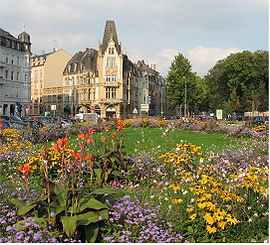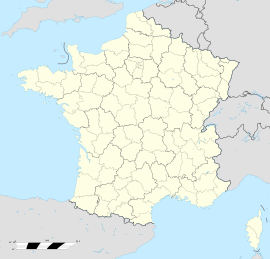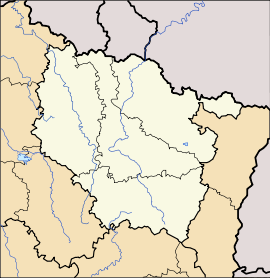- Thionville
-
Thionville
Administration Country France Region Lorraine Department Moselle Arrondissement Thionville Est and Ouest Intercommunality Portes de France-Thionville Mayor Bertrand Mertz
(2008–2014)Statistics Elevation 147–423 m (482–1,388 ft)
(avg. 150 m/490 ft)Land area1 49.86 km2 (19.25 sq mi) Population2 40,907 (1999) - Density 820 /km2 (2,100 /sq mi) INSEE/Postal code 57672/ 57100 1 French Land Register data, which excludes lakes, ponds, glaciers > 1 km² (0.386 sq mi or 247 acres) and river estuaries. 2 Population without double counting: residents of multiple communes (e.g., students and military personnel) only counted once. Coordinates: 49°21′32″N 6°10′09″E / 49.3588888889°N 6.16916666667°E
Thionville (German: Diedenhofen, Luxembourgish: Diddenuewen), is a commune in the Moselle department in Lorraine in north-eastern France. The city is located on the left bank of the river Moselle, opposite its suburb Yutz.
Contents
Demographics
The population of Thionville boomed in the Industrial Revolution, but the economic slowdown of the 1970s affected the town and the surrounding area, causing a population decrease. The population rose again in the 1990s and in suburban Hettange-Grande in the east, although the population of the western part of the new agglomeration is decreasing around Hayange. The agglomeration is still losing population but the decrease has been slowed down. Due to Thionville's proximity to Luxembourg (15 kilometres from the border), the town's population and quality of life have both increased since the end of the 1990s.
History
After the fall of the Western Roman Empire, the region was inhabited by the Germanic Alamanni and became part of the medieval Holy Roman Empire, known as Diedenhofen in German.
The Synod of Thionville was held here from 2 February 835. It reinstated Emperor Louis the Pious and reversed his former conviction of crimes — none of which he actually committed — and deposed the Archbishop of Rheims, Ebbo. The Synod was composed of 43 bishops. On 28 February 835 in Mainz, Ebbo admitted that Louis had not committed the crimes of which he had been indicted and for which he had been deposed as Holy Roman Emperor.
Eskil, Archbishop of Lund, was imprisoned at Thionville (at the instigation of the Archbishop of Bremen?) on his return from his 1153 pilgrimage to Rome.
The Siege of Thionville in June 1639 occurred as part of the Thirty Years' War. In 1659 Diedenhofen was annexed by France.
The writer François-René de Chateaubriand was left for dead during Condé's military émigré expedition against Thionville in 1792
After the Franco-Prussian War of 1870, the area of Alsace-Lorraine was annexed by the newly created German Empire in 1871 by the Treaty of Frankfurt and became a Reichsland. Thionville became Diedenhofen again, a prosperous German city. Some large neo-Romanesque buildings typical of the German Empire were constructed in the city. German Army decided to build a fortress line from Mulhouse to Luxembourg to protect their new Reichsland. The centerpiece of this line was the great Moselstellung, a fortress system protecting Metz and Thionville.
The fortifications around Thionville centered on three main forts: the Fort de Guentrange on the northwest side of Thionville, Fort de Koenigsmacker to the northeast, and the Fort d'Illange to the south. Each position was surrounded by several ditches, with shelters and observation cupolas. A large barbed wire belt defended by machine gun completed the defensive system.
Following the armistice with Germany ending the First World War, the French army entered Thionville in November 1918 and the city was returned to France at the Treaty of Versailles in 1919.
Jean-Marie Demange, who had served as the town's mayor for thirteen years, committed suicide in 2008 after killing his wife with two gunshots in the head.
Economy
The following industries are present in or near Thionville:
- Iron and steel plant
- Chemical plant
- Cement factory
Transport
The Gare de Thionville railway station offers connections with Luxembourg, Metz, Nancy, Paris, Strasbourg, Brussels, Zürich and several regional destinations. The A31 motorway connects Thionville with Luxembourg and Metz.
Administration
Incorporations:
- Veymerange, in 1967
- Volkrange, in 1970
- Garche (not contiguous with the rest of the commune), Kœking and Œutrange in 1970
Thionville is divided into two cantons. Thionville Est, which includes the city, and Thionville Ouest.
- Thionville Est: 19,063 (46.6% of the total population)
- Thionville Ouest: 21,844 (53.4% of the total population)
See also
- Merlin of Thionville
Sources and external links
- Taxis de Thionville
- Page Thionville
- Site sur la culture et l'histoire de Thionville
- Nombreuses photos de Thionville de 1900 a nos jours
- Site alternatif portail de Thionville
- Not official Thionville Web site
 This article incorporates text from a publication now in the public domain: Herbermann, Charles, ed (1913). Catholic Encyclopedia. Robert Appleton Company. passim
This article incorporates text from a publication now in the public domain: Herbermann, Charles, ed (1913). Catholic Encyclopedia. Robert Appleton Company. passim
Categories:- Communes of Moselle
- Subprefectures in France
Wikimedia Foundation. 2010.



